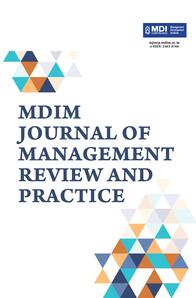
1Department of Commerce, PSG College of Arts & Science, Coimbatore, Tamil Nadu, India
Creative Commons Non Commercial CC BY-NC: This article is distributed under the terms of the Creative Commons Attribution-NonCommercial 4.0 License (http://www.creativecommons.org/licenses/by-nc/4.0/) which permits non-Commercial use, reproduction and distribution of the work without further permission provided the original work is attributed.
Examining an industry’s technological upgradation is unexpected and unavoidable. The subsequent technical innovation is driven by the expectations and wants of the consumer for each product. History shows that switching from one technology revolution to another usually takes longer than the current trend. The industrial sector is currently faced with several risks, and it will take some time for management and staff to become used to new technology. This article presents the characteristics of both Industrial 4.O and Industrial 5.O and sustainability by using secondary data from various sources like journals, website, etc. The world has framed Sustainable Development Goals to know their pathway toward the sustainability of all living organisms and monitor their activities which will boost the countries to travel on a sustainable path and this article provides the keynotes about the goals. This article concludes that innovation in any domain should consider sustainability as the main theme.
Sustainability, economic growth, industry evolution, upgradation of technology
Ahmad, S., Miskon, S., Alabdan, R., & Tlili, I. (2020). Towards sustainable textile and apparel industry: Exploring the role of business intelligence systems in the era of Industry 4.0. Sustainability, 12(7), 2632.
Bongomin, O., Nganyi, E. O., Abswaidi, M. R., Hitiyise, E., & Tumusiime, G. (2020). Sustainable and dynamic competitiveness towards technological leadership of Industry 4.0: Implications for East African community. Journal of Engineering, 2020, 1–22.
Chen, Z., & Xing, M. (2015). Upgrading of textile manufacturing based on Industry 4.0. In 5th international conference on advanced design and manufacturing engineering (pp. 2143–2146). Atlantis Press. https://doi.org/10.2991/icadme-15.2015.400
Duarte, A. Y. S., Sanches, R. A., & Dedini, F. G. (2018). Assessment and technological forecasting in the textile industry: From first industrial revolution to the Industry 4.0. Strategic Design Research Journal, 11(3), 193.
Faridi, M. S., Ali, S., Duan, G., & Wang, G. (2020). Blockchain and IoT based textile manufacturing traceability system in Industry 4.0. In International conference on security, privacy and anonymity in computation, communication and storage (pp. 331–344). Springer International Publishing.
Ghoreishi, M., Happonen, A., & Pynnönen, M. (2020). Exploring Industry 4.0 technologies to enhance circularity in textile industry: Role of Internet of Things. In Twenty-first international working seminar on production economics (pp. 16). Springer Nature.
Ghoreishi, M., & Happonen, A. (2021). The case of fabric and textile industry: The emerging role of digitalization, Internet-of-Things and Industry 4.0 for circularity. In Proceedings of sixth international congress on information and communication technology: ICICT 2021, London, Volume 3 (pp. 189–200). Springer Singapore.
Happonen, A., & Ghoreishi, M. (2021). A mapping study of the current literature on digitalization and Industry 4.0 technologies utilization for sustainability and circular economy in textile industries. In Proceedings of sixth international congress on information and communication technology: ICICT 2021, London, Volume 4 (pp. 697–711). Springer Singapore.
Küsters, D., Praß, N., & Gloy, Y. S. (2017). Textile learning factory 4.0—Preparing Germany’s textile industry for the digital future. Procedia Manufacturing, 9, 214–221.
Rathore, B. (2022). Textile Industry 4.0 transformation for sustainable development: Prediction in manufacturing & proposed hybrid sustainable practices. Eduzone: International Peer Reviewed/Refereed Multidisciplinary Journal, 11(1), 223–241.
Rathore, B. (2023). Textile Industry 4.0: A review of sustainability in manufacturing. UGC Approved Research Journals in India| UGC Newly Added Journals|(IJNMS), 10(1), 38–43.